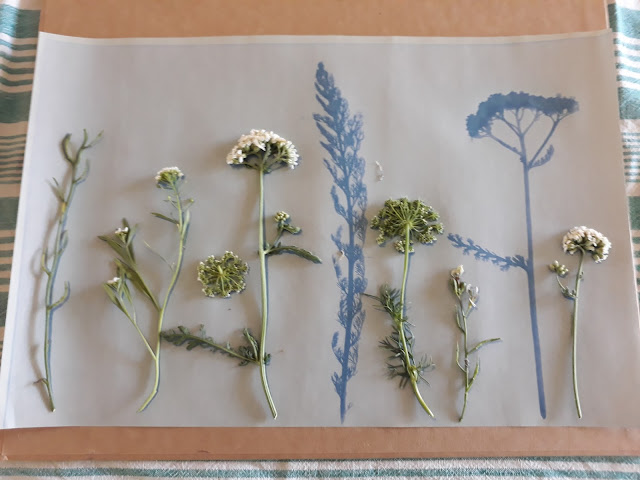Clustered flowerheads, delicate umbels, whisper-thin stems and feathery leaves casting shadows and leaving beautiful prints.
These stunning white on cyan-blue sunprints are technically known as cyanotypes. The process is actually a photographical one, capturing an image without a camera, that was developed by Sir John Herschel. It was a woman, botanist and pioneering photographer, named Anna Atkins, who began using the process, in the mid 19th Century, to record finely detailed botanical images of sea algaes and ferns. I would dearly love to spend time looking at every single page of her exquisite book, but this YouTube clip is the closest I could find to holding it in my own hands. Hers was the first book ever published exclusively with photographic images. How amazing!
The process of making these stunning prints is simple and oh so satisfying!
Snippets of my garden in a sunprint.
A magical process that results in stunning prints.
These stunning white on cyan-blue sunprints are technically known as cyanotypes. The process is actually a photographical one, capturing an image without a camera, that was developed by Sir John Herschel. It was a woman, botanist and pioneering photographer, named Anna Atkins, who began using the process, in the mid 19th Century, to record finely detailed botanical images of sea algaes and ferns. I would dearly love to spend time looking at every single page of her exquisite book, but this YouTube clip is the closest I could find to holding it in my own hands. Hers was the first book ever published exclusively with photographic images. How amazing!
The process of making these stunning prints is simple and oh so satisfying!
Gather sprigs of plant material from your garden.
Gather printmaking supplies ...
cyanotpye paper, thick piece of cardboard, perspex, water bath.
Lay cyanotype paper onto thick cardboard.
Sandwich plant material between the paper with clear perspex on top.
Lay out in sun for up to 5 minutes.
Carefully remove plant material to reveal beautiful prints.
Rinse the paper in a tub of water and watch as the prints fade to white.
Dry on a flat surface.
As the sunprint dries, the background will become a deeper and deeper cyan blue.
Here are two of the other sunprints I made:
Almost-finished rocket flowers.
Scattered dry umbels of Queen Anne's Lace.
There are many beautiful projects that can be made with these stunning sunprints. From simply framing your favourite print to using the gorgeous paper to make bookmarks, handmade cards, gift boxes or as wrapping paper. I would love to explore how to make these prints on fabric. How lovely would that be!
Sunprints are a simple and satisfying way to capture the botanical beauty of plants. I made my prints in the sunshine of a scorching hot Summer's day. Perfect for that kind of weather. I think the process could also be quite addictive too!!
Meg












I have never seen nor heard of this process before. Simply beautiful!
ReplyDeleteEach print was a joyous surprise, Debbie. A simple and beaitiful and rewarding process. Meg:)
DeleteMeg, they are beautiful. I'd like to try this one of these days. Another project for my to-do list. :)
ReplyDeleteI'm curious to know if it works on fabric. :)
It's a lovely project for a sunny day, Nil. I hope you get to try it soon. Meg:)
DeleteMeg, I thought the first photo was fabric. How fascinating! Some lovely prints there. You can make prints like that on fabric I am sure. I just can't remember how it is done at the moment but somebody will probably know.
ReplyDeleteI would live to try this on fabric, Chel. I have seen some live fabric cyanotype projects on the internet. Meg:)
DeleteLovely project, perfect way to capture your summer blooms.
ReplyDeleteIt was a lovely process, Marlene. Each print is beautiful! I am looking forward to playing around more with cyanotypes. Meg:)
DeleteWow Meg. You've taught me something new! What an interesting and effective process. Thanks for sharing. :)
ReplyDeleteIt's a really simple process, Chris and one which I want to explore more. I used a Sunprint kit which I had in my little art cupboard but I know that you can prepare your own cyanotype papers by oainting in a special solution. I also want to see how the process is done with fabric. It's lovely to discover new techniques and processes like this. Meg:)
DeleteDo you know I have that exact same kit which I bought years ago but haven't done anything with it. Do you really need the persplex where did you buy that from?
ReplyDeleteThe perspex was in my kit. I have had my kit for years too and decided these recent hot days were perfect for sunprinting. Meg:)
Delete...and yes, the perspex results in crisper prints. Without it, image is more blurred but that can also be beautiful. Meg 🌿
DeleteOh my these are beautiful and blue is my favourite colour another activity to add to my todo list.
ReplyDeleteI love the deepening of the cyan blue as the paper dries, Erica. It's a gorgeous colour! Meg:)
Delete